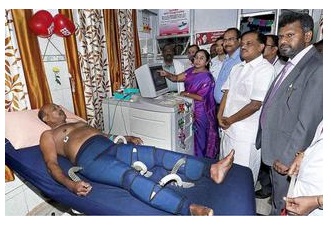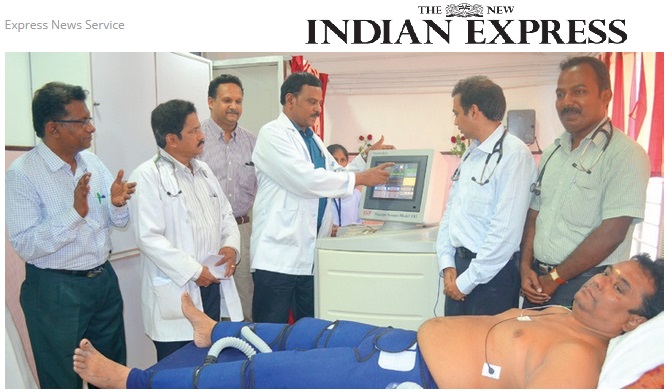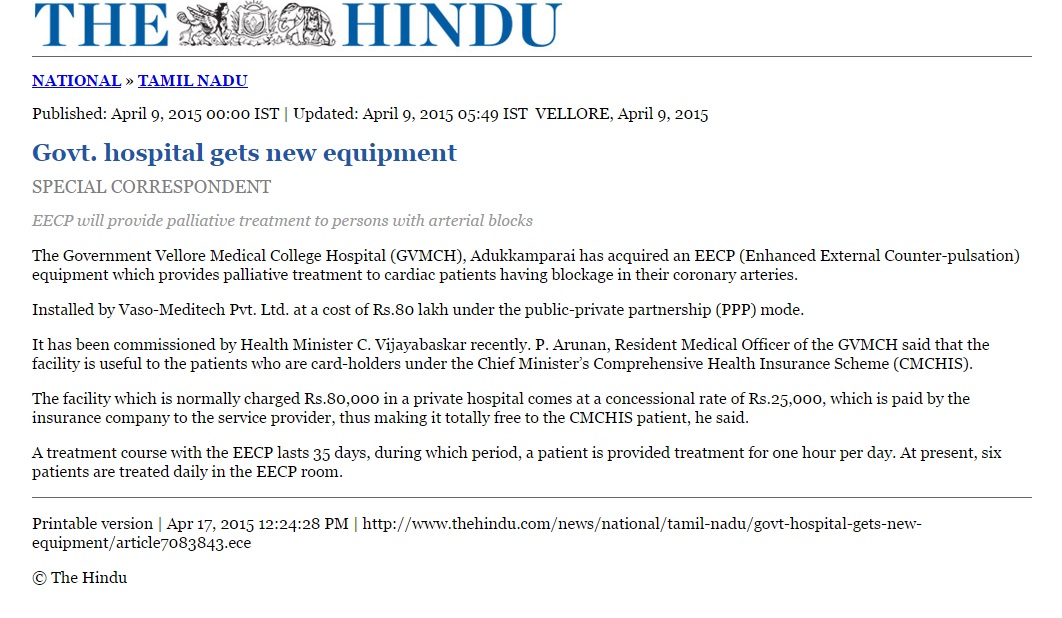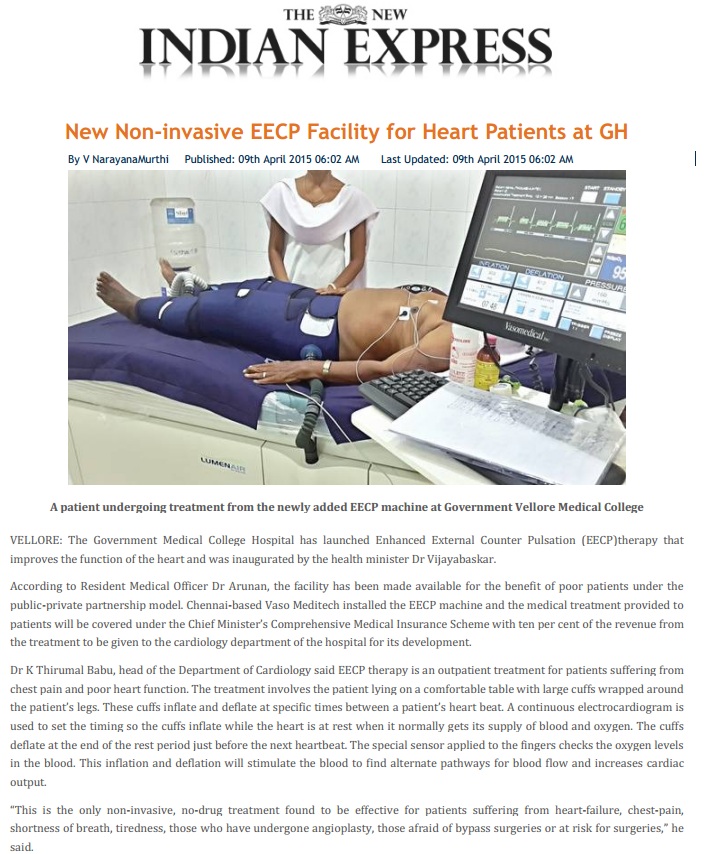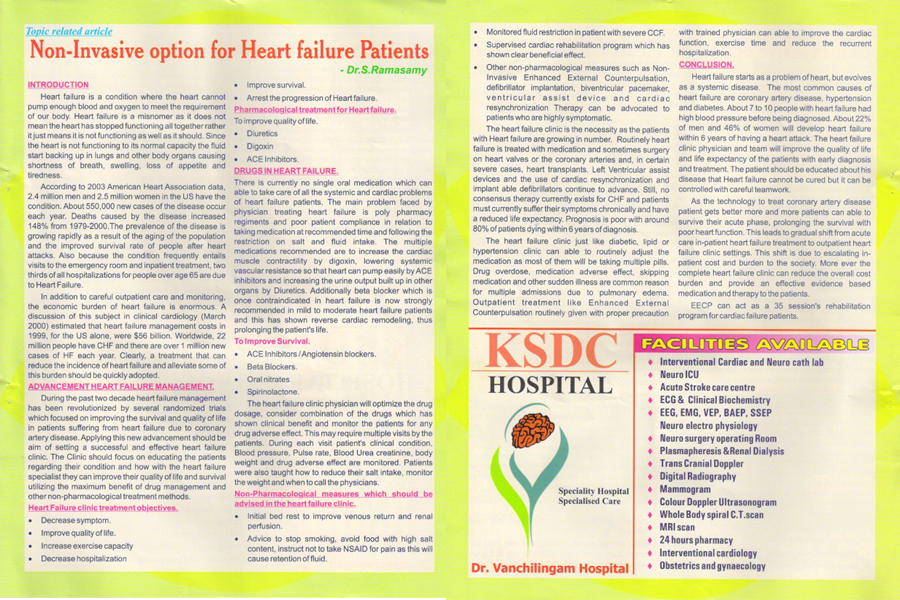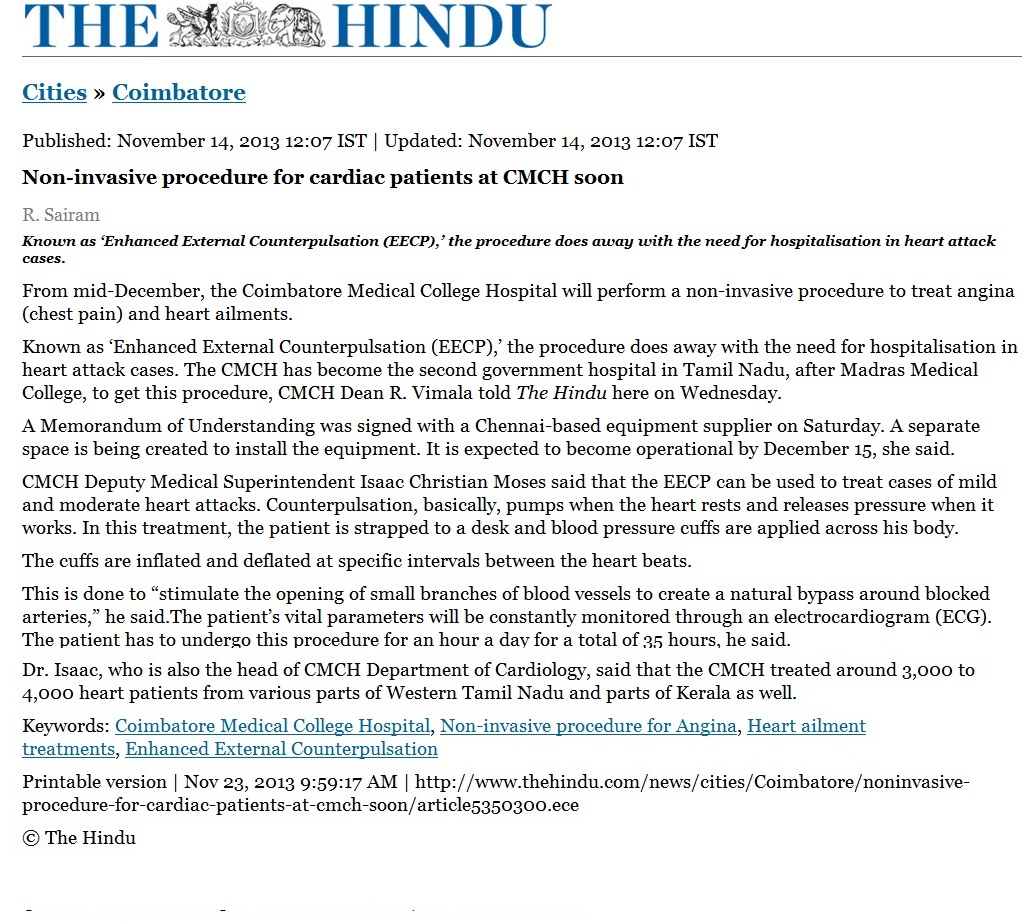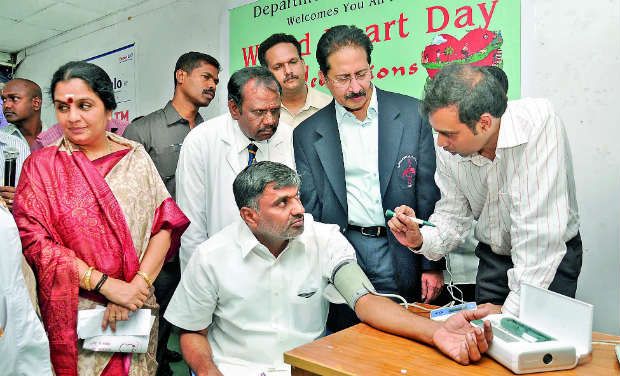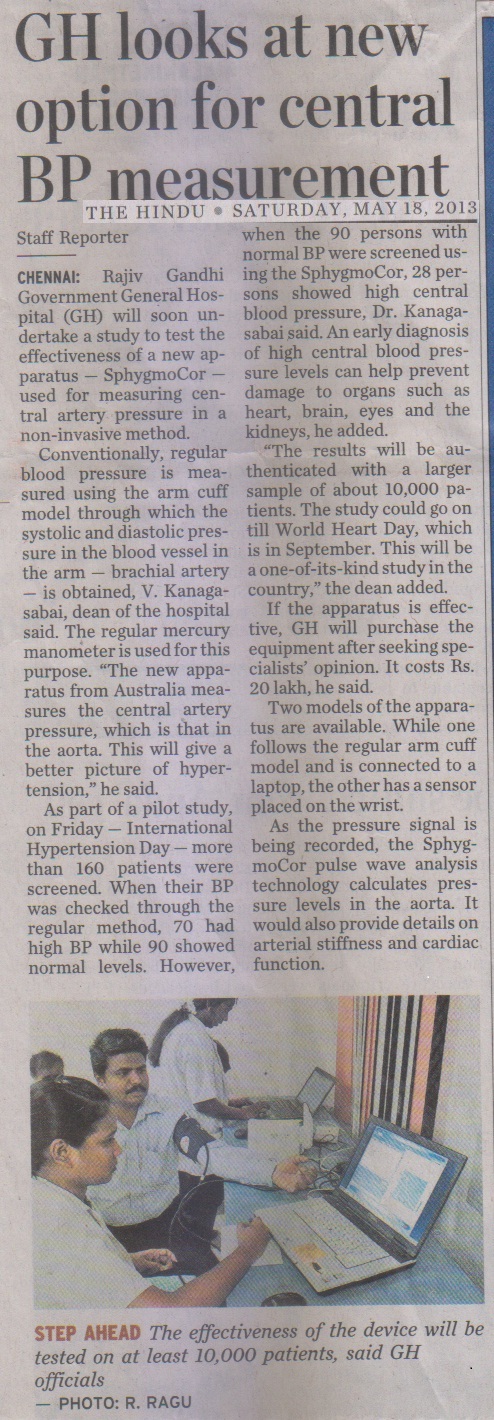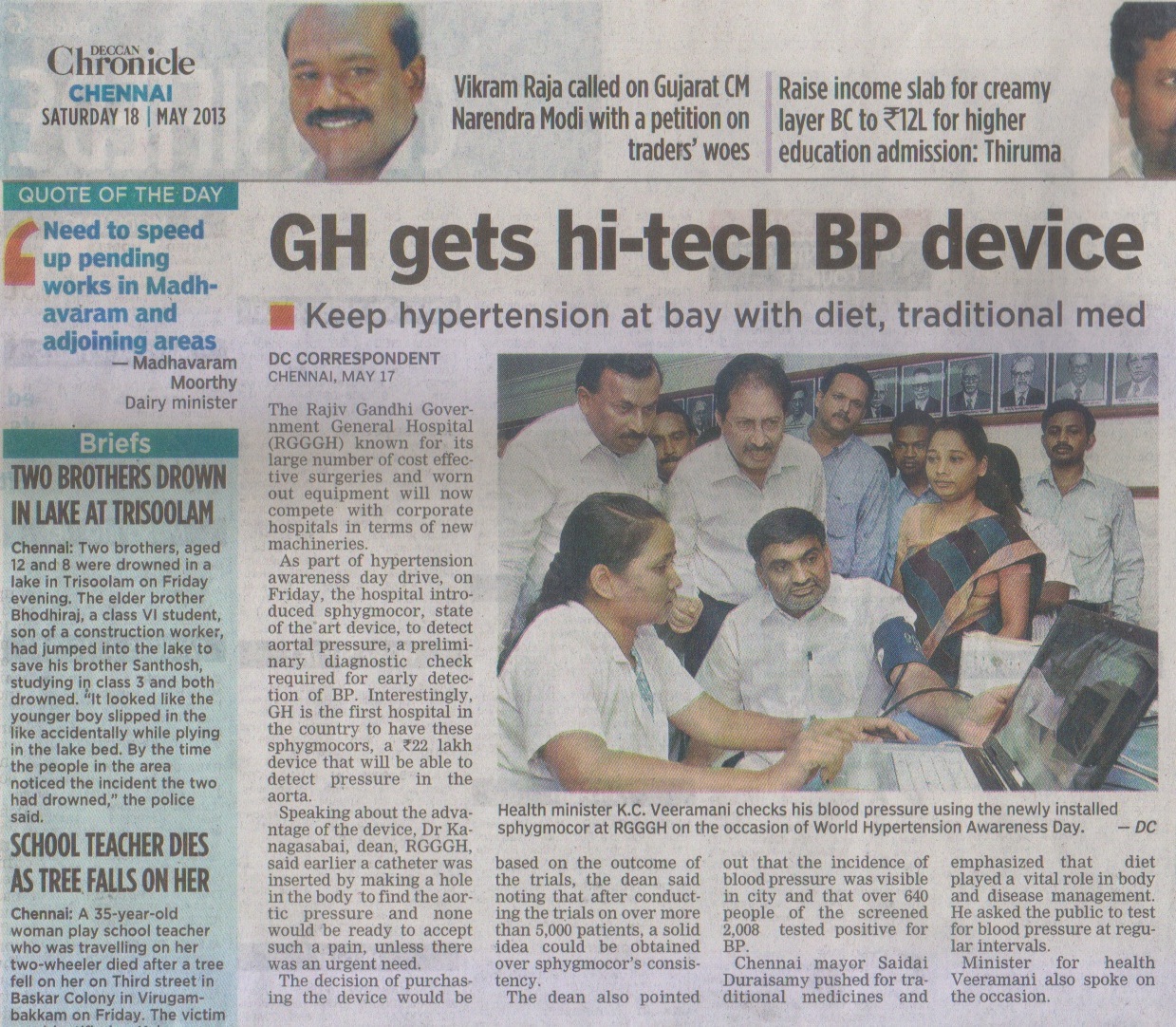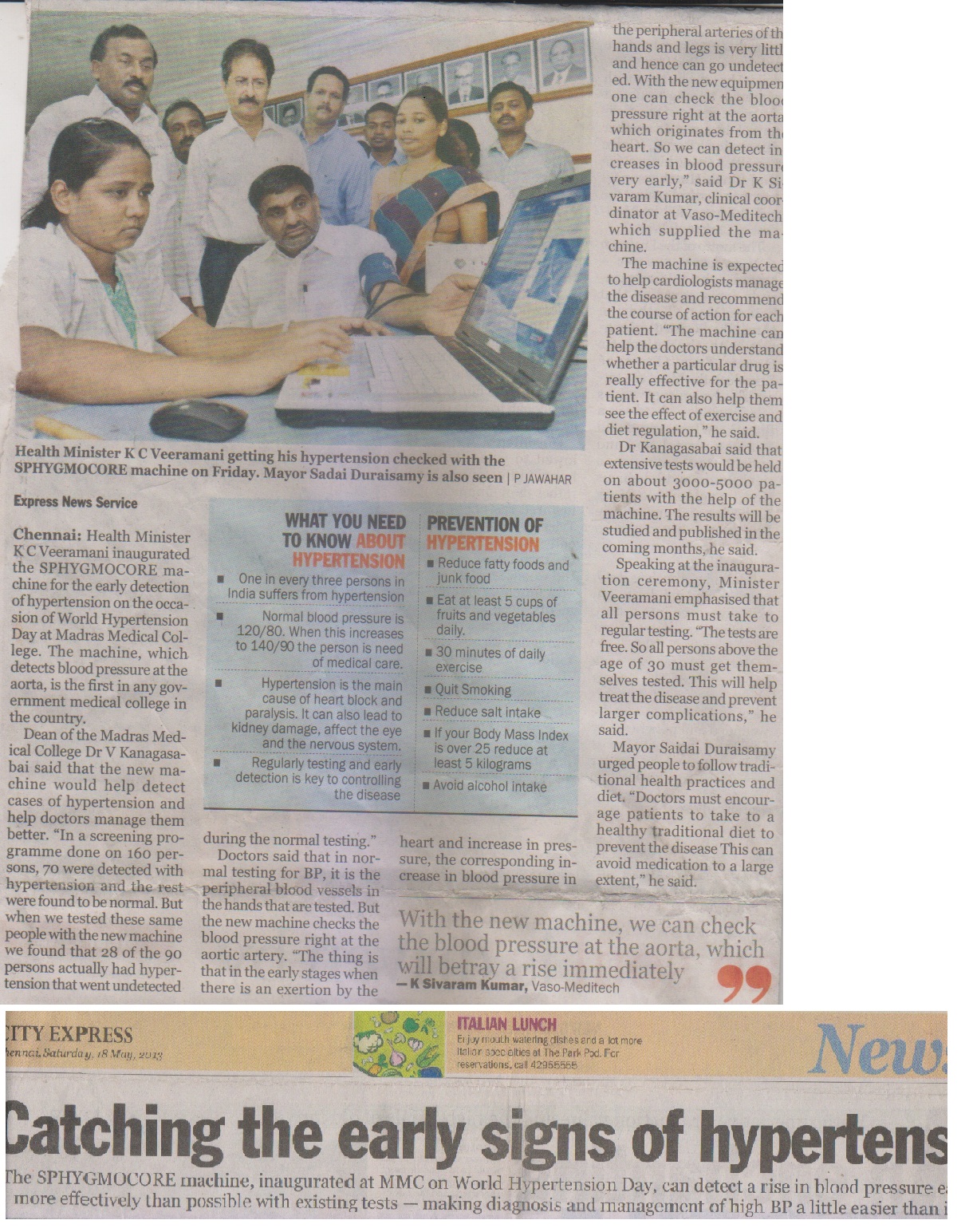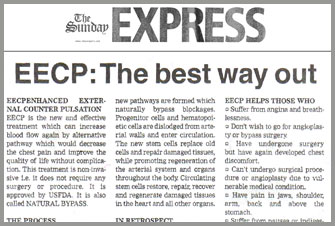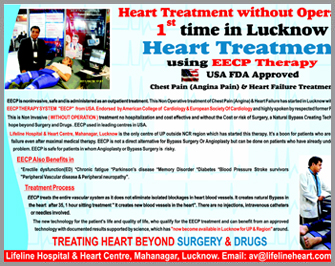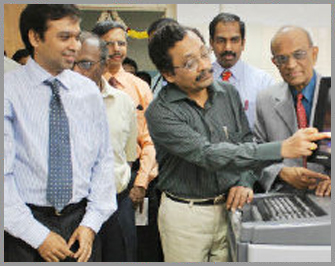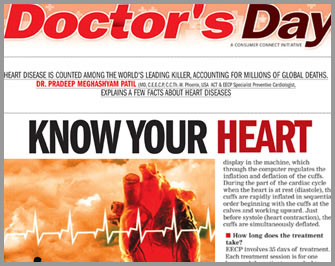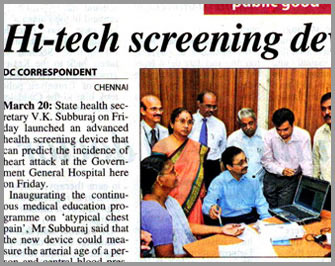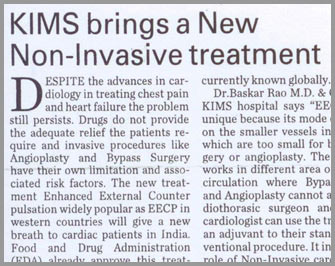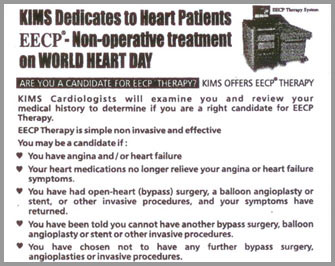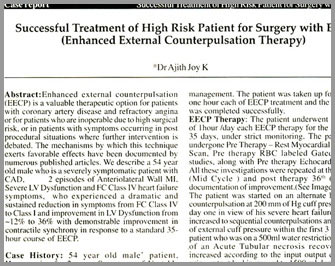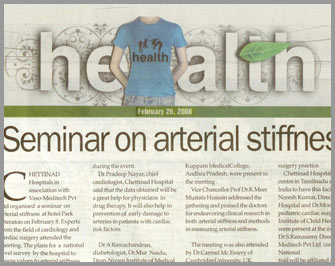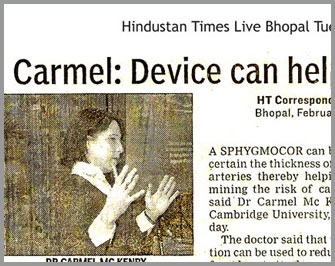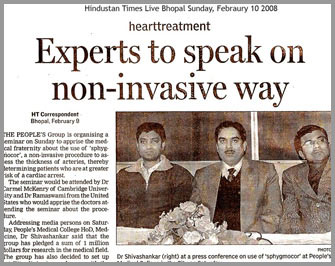Press Relaese
Vaso-Meditech Pvt Ltd ( Exclusive Distributor and Clinical Support for EECP in India)
Chettinad Hospitals with Vaso-Meditech organized an Experts Meet in Chennai to design a National Study on arterial stiffness and to introduce its Robotic Surgery program. Chettinad Hospitals and Vaso-Meditech Pvt Ltd conducted an Experts meet in Chennai, on leading edge diagnostics and therapeutics at Park Sheraton on 8th Feb 2008. Experts in the field of cardiology and cardiac surgery attended the meeting. A National multi centric survey to assess values for arterial stiffness in normal population and in patient with cardio vascular risk factors like diabetes and hypertension etc is planned by the Hospital.Dr.Pradeep Nayar, Chief Cardiologist of Chettinad Hospital said that the data obtain will go a long way in helping physicians to optimize drug therapy. It will also help in prevention of cardiac events when used to detect early damage to arteries in patients with cardiac risk factors. This will help patients to adopt life style modifications early, to prevent further damage to their heart and blood vessels.
Dr.A.Ramachandran, leading diabetologist of Chennai spoke about the alarming trend of increasing prevalence of Diabetes in India. By 2025 Indian will have 69.9 Million Diabetic patients.
Dr.MUR Naidu, Dean & Head of the department of Clinical Pharmacology Nizam Institute of Medical Science, Hyderabad stressed "measuring arterial stiffness is gaining importance as one of the major predictor of cardiovascular mortality and morbidity" and pointed out pulse wave velocity and pulse wave analysis are two simple non-invasive technology for the measurement of arterial damage occurred due to traditional risk factors.
Dr.Dhanapal, Dean, Kilpauk Medical College, Dr.Suresh Krishnamoorthy, Director, Kuppam Medical College, Andhra Pradesh, were present in the meeting and expressed their keen interest in the study.
Vice Chancellor Prof Dr.K.Meer Mustafa Hussain addressed the gathering and praised the doctors for endeavoring clinical research in arterial stiffness and stressed "measuring arterial stiffness in preventive health check will help physicians to identify risk much earlier than before".
The meeting was also attended by Dr.Carmel Mc Eniery, Phd., of Cambridge University, UK, who is the study advisor for the project and Tony Doherty International Clinical manager AtCor Medical.
Dr.S.Ramasamy Director of Vaso-Meditech Pvt Ltd stated that Vaso-Meditech Pvt Ltd will join hands with Cambridge University and leading hospital across India to design a National study to collect data on arterial stiffness and Central blood pressure using AtCor medical SphygmoCor device.
Dr.Ravi Kumar, Director, Cardio Thoracic Unit of Chettinad Hospitals, discussed the role of robotic surgery in current cardiac surgery practice. Chettinad Hospitals is the first centre in Tamilnadu and fourth in India to have this facility. Dr.Naresh Kumar, Director, Harvey Hospital and Dr. Moorthy, Chief Pediatric Cardiac Surgeon, Institute of Child Health, Egmore attended at the meeting.
Press Relaese : Hyderabad
Vaso-Meditech Pvt Ltd ( Exclusive Distributor and Clinical Support for EECP in India)
Benefits of Enhanced External Counter pulsation (EECP) presented in Cardiological Society of India 59th Annual Conference December 2007. Frontier lifeline Hospital ( Dr.K.M.Cherian Heart Foundation) presented Benefit of EECP in patients with severe Left Ventricular Dysfunction in patients posted for High Risk Coronary Artery Bypass Surgery.Dr.Pradeep Nayar the principle Investigator and consultant Interventional cardiology Frontier Lifeline Hospital presented the study: SHORT COURSE OF ENHACED EXTERNAL COUNTERPULSATION (EECP) IMPROVES MYOCRDIAL PERFUSION IN PATIENTS WITH SEVERE LEFT VENTRICULAR DYSFUNCTION POSTED FOR HIGH-RISK CORONARY ARTERY BYPASS GRAFT. The study concluded short course of ten hours EECP instead of standard 35 sessions has significantly improved patients myocardial perfusion and gated left ventricular ejection fraction.
The author commented these were the group of High Risk patients with severe LV dysfunction and viable myocardium assessed by Rest Myocardial perfusion. We decided to take these patients for High Risk CABG with IABP support but provided them with 10 session of Short course of EECP prior to Surgery. We are encouraged by the results which show significant improvement of perfusion to the viable myocardium and improvement in Ejection fraction assessed by Gated Left Ventricular ejection fraction. We were able to avoid IABP in most of these patients. We believe a controlled randomize trail is warranted to explore this opportunity in Severe Heart failure patients since there options are very limited.
If you need a free copy of the abstract presented in CSI Hyderabad December 2007 please E-MAIL to dr.rams@vasomeditech.com.
Dr.S.Ramasamy Director
Director Main Office:
Vaso-Meditech Pvt Ltd1, Parthasarathy Street
M.C.Road
Chennai-600021.
Branch Office:
4/74 Thanthai Periyar Street,(ECR Road) Neelangari,
Chennai-600041.
Contact Detail:
Phone : +91 44 24492946Fax : +91 44 24490161
Mobile: +91-9003078181
E-mail: dr.rams@vasomeditech.com,
: samjip@gmail.com
Web site : www.vasomeditech.com
Indian National Enhanced External Counter pulsation Registry was Inaugurated in Chennai by M.G.R. University Chennai Vice Chancellor.
National registry on Enhanced external counter pulsation (EECP) treatment is inaugurated in Chennai by Vice Chancellor Prof Dr.K.Meer Mustafa Hussain. He addressed the gathering and praised the doctors for endeavouring clinical research to bring the cost effective and potential benefit of Non-Invasive treatment EECP in cardiology. Cardiologist and cardio thoracic surgeons from all major cities in India meet here to voice their opinion on this new non-invasive treatment for patient with Chest pain and heart failure. Dr.K.M.Cherian Chief cardio thoracic surgeon and Chairman of frontier life line hospital announced this registry will include around 25 centres’, which currently provide EECP treatment in India and will share data with International registry in Pittsburgh University Pennsylvania USA.Frontier Lifeline Hospital will be the Centralized chief co-ordinating centre for this registry in India. The registry will be funded by Vaso-Meditech Pvt Ltd . Dr.S.Ramasamy Director of Vaso-Meditech Pvt ltd commented that this registry will bring valuable data base to the cardiologist community to use the EECP treatment effectively to the needy patients. Dr.Pradeep Nayar Consultant cardiologist of Frontier Lifeline Hospital and Chief co-ordinator for the Indian patient EECP registry explained this registry will promote awareness within physician community about the EECP therapy and will annually conduct medical education programs.
Prof Dr.M.Dhanapal Chief Cardiologist and Dean of Govt. Kilpauk medical college commented that this treatment would benefit many patients if the insurance company come forward and reimburse the treatment cost. He requested the expert panel committee of IPER to formulate a guideline to insurance company for patient reimbursement.
Dr.M.P. Naresh Kumar senior cardio thoracic surgeon and Chairman of Harvey health care centre said the data presented in this conference on patient undergone EECP treatment are encouraging and EECP is currently the only non-Invasive treatment option for patient with heart failure. Other prominent cardiologist who attended this meeting were Dr.Sanjay Mittal ( Apollo Indraprastha), Dr.Shailesh Jain ( Escorts heart institute) , Dr.Suresh Krishnamurthy ( Medical direct or abnnd consultant cardiologist PES institute of medical science and research kupam ), Dr.V.Chockalingam ( Former Prof Madras Medical College), Dr.Baskar Rao ( Cardio thoracic surgeon and Managing Director KIMS Hyderabad), Dr.Saji Jose ( Consultant cardiologist St.Gregorios Cardio Vascular Centre Kerala), and Dr.P.Sukumar ( HOD cardiology Madras medical college). Physicians from Delhi, Mumbai, Kolkata, Bangalore Kerala and also various insurance cooperation including Government Employee State Insurance company (ESI) directors attended the conference. The presentations were well attended by more than 80 physicians across the country.
The conference is also attended by foreign delegates from USA and Australia.

Vice Chancellor Prof Dr.K.Meer Mustafa Hussain presenting the first IPER registry certificate to Dr.Pradeep Nayar consultant cardiologist Frontier lifeline Hospital accompanying them in the satge are Prof Dr. V.Chockalingam( Left), Dr.K.M.Cherian, Prof Dr.Dhanapal Dean Kilpauk Medical college Chennai.

Dr.S.Ramasamy Director of Vaso-Meditech Pvt Ltd and IPER data quality control presenting Indian patient data in the conference. In the stage left Dr.Naresh Kumar cardio Thoracic surgeon and Chairman of Harvey Super speciality Hospital and Prof Dr.Sukumar Former HOD of cardiology Madras medical college.

Dr.Suresh Krishnamurthy Medical director of PES institute of medical sciences and research kupam addressing the conference.

Cardiologists and physician in the conference interacting with the speakers.
THE HINDU -Monday
EECP can be classified as "anti-aging treatment"
The procedure is no replacement for bypass or angioplasty
Enhanced external counter pulsation (EECP), a method adopted widely in western countries as a mode of treatment for heart failure, should be classified as an 'anti-ageing' treatment, according to K.Meer Mustafa Hussain, Vice-Chancellor, Tamil Nadu Dr MGR Medical University.
He was speaking at the inauguration of the Indian Patient EECP Registry here on Saturday. The registry is an effort of Frontier Lifeline Hospital, whose chairman K.M.Cherian, was also present. The registry will have 30 centres that provide the treatment across the country and would share data with the international registry in Pittsburgh University, Pennsylvania, US.
Dr. Hussain suggested that the Government support the program for the benefit of poor patients. He called for efforts to improve awareness of the procedure among the patients and the medical community Doctors should carefully select Indian patients keeping in mind their financial, physical and physiological needs. Lifestyle modifications and yoga played an important role in preventing heart diseases, he pointed out. A non-invasive outpatient procedure today, EECP was developed in Harvard University in the 1950s but it was in Chinese group reported a largescale use of this technique, he said.
The procedure is not a replacement for bypass or angioplasty, but helped patients who could undergo elaborate heart surgeries.
Frontier Lifeline Hospital will be the centralized chief coordinating centre for the registry that is to be funded by Vasco-Meditech.
The registry is expected to provide a valuable database for cardiologists to decide on the mode of treatment.
The registry will also conduct national multi-centric studies to observe arterial stiffness pattern in the Indian population, thus giving insight into the incidence of premature coronary artery disease in the younger age group. At the conference, a discussion on introducing costs-effective signal telemedicine device in rural areas was also held.
Pradeep Nayar, chief coordinator for the Indian registry, said the EECP concept had been around for 50 years.
But it gained importance only in the early part of this decade, he added.
www.newindpress.com - Sunday
Shift towards non-invasive cardiology.
CHENNAI: A National registry on Enhanced External Counter Pulsation (EECP) treatment, a non-invasive treatment for patients with chest pain and heart failure, was inaugurated on Saturday, said a press release.The registry is funded by the Vaso-Meditech Private Limited. The registry would include around 30 centres, which provide EECP treatment in India and also share data with the International registry at Pittsburg University, Pennsylvania, USA.
Above news in www.newindpress.com
Heart of the matter.
FRONTIER Life Line Hospital has introduced a new diagnostic system, SphygmoCor Px pulse wave analysis, to its preventive cardiology program to measure the stiffness of the arteries. The system will non-invasively measure stiffness and accurate blood pressure of the central arteries which was so far possible only by invasive procedures.The system can screen patients suffering from diabetes, hypertension and other cardiac risk factors to predict occurrence of future cardiac problems. This will give the option for the cardiologist to start early treatment and recommend necessary preventive steps like life-style modification, diet and exercise.
A growing number of cardiovascular risk factors, like diabetes, high cholesterol, smoking, high blood pressure and ageing, have been linked to heart attack. These factors often lead to stiffer arteries, which in turn increases resistance and therefore increases the work that the heart must do and leads to heart attack, stroke and reduction in heart pumping action. Many of the patients are not even aware of the heart disease until they have a heart attack. Heart problems may develop without any symptoms in many diabetic patients.
In today's high stress lifestyle, many young individuals develop heart disease. In these patients, measuring arterial stiffness would detect any existing heart problem, which in turn would allow for early and aggressive preventive health check up programs measure blood sugar level and cholesterol level. These two factors increase ones risk of getting heart disease by increasing arterial stiffness.
Arteries also age according to chronological age in healthy individuals. But what is inevitable in cardiac patients is that their arteries age faster than their chronological age. This is known as premature arterial ageing. Frontier Life Lines new diagnostic system will be able to diagnose patients with premature arterial ageing who are more likely to get heart attack and stoke. Commenting on this new diagnostic system Dr KM Cherian said, "Measuring large arterial stiffness and central blood pressure is emerging as a new indicator to predict future cardiovascular event. This system will enable cardiologists to start the patient on medical treatment and assess the improvement in cardiac status in response to the treatment. It will also be used in our hypertension clinic to adjust the medication for maximum benefit to the patients. The system is USA FDA approved and imported from Australia." Dr Pradeep G Nayar,
Dr S. Ramasamy,
(Frontier Lifeline Hospital)
Hindustan Times
BHEL okay for people's General Hospital.
PEOPLE'S GENERAL Hospital(Hi-Tech Division) has been approved by the Bharat Heavy Electricals Limited (BHEL) for the treatment of Angina.A press release today said that the People's General Hospital is the second in the country after Escorts Heart Institute, New Delhi, which has EECP facility. With this new technology patients could be treated without any surgery, angioplasty, anesthesia or even hospitalization.
A number of patients have been treated by this technique with good results. The BHEL administration has approved the treatment for its employee in this hospital.
THE HINDU
Symposium on trends in cardiology.
A continuing medical education programme on "Newer trend in cardiology" was held at Kilpauk Medical College.K.M.Cherian, chairman of Frontier Lifeline, spoke on the role of non-invasive treatment and diagnostic modality in managing cardiovascular diseases.
The symposium, also attended by cardiologists from private hospitals, focused on cardiac patients who were beyond the ambit of available and hybrid modalities that could be practiced to rectify the defects. Chest pain Dr.Cherian said: "The main idea [behind the symposium] is to enunciate the competence of enhanced external counterpulsation [EECP] treatment that increases the role of the cardiologist to treat patients with chest pain and poor exercise tolerance who have reached maximal medication and amendable for conventional interventional procedures. We cardiologists are adapting ourselves to a range of newer trends in cardiology to treat patients efficiently and to convene with international standards in the field of cardiology." Blood supply The EECP creates a natural mechanism to boost blood supply through adjustable pneumatic cuffs that are wrapped around the lower parts of the body.
The procedure is done several times, usually in 35 one-hour out patient sessions, six times a week for seven weeks. The treatment works in areas of blood circulation where bypass surgery and angioplasty is not possible.
When blocked arteries prevent blood supply to the heart, the procedure helps to maintain supply through minute blood vessels or the dormant collaterals to the portion of heart starved of blood. Standard procedure Cardiothoracic surgeons and invasive cardiologists can use the treatment as adjuvant to standard interventional procedure.
The U.S. Food and Drug Administration, has approved the treatment for chronic angina and heart failure.
DECCAN CHRONICLE Chennai Wednesday 9th November 2005.
Device for cardiac care.
As one grows older, the arteries in the heart stiffen, leading to a major cardiac problem. Now, city-based Frontier Lifeline Hospital Dr K.M.Cherian Heart Foundation has imported a diagnostic device from Australia that will measure the stiffness of the cardiac arteries and help prevent complications like stoke and heart failure.The device, SphygmoCor PX Pulse Wave Analysis System, will be used to non-invasively measure the stiffness of the central arteries. This is the first time such a device has been used in India in preventive cardiology. The system would screen the stiffness of the central arteries by reading the peripheral arteries.
The buffer function of the arteries decreases as they become stiffer. The stiffness contributes to the increase in blood pressure, which could lead to stroke, heart attack and even heart failure. Specialists can use the system to screen people with hypertension, diabetes and even youngsters suffering from stress, and recommend necessary preventive steps, including modification of lifestyle, diet and exercise.
Dr Cherian, the CEO and chairman of the hospital, says, "Measuring aortic stiffness is emerging as a new indicator to predict future cardiovascular event. This system will enable the cardiologist to establish the medical treatment for the patient and assess the improvement in cardiac status in response to the treatment".
The New Indian Express Edition Kochi
EECP facility for heart treatment launched.
Frontier Cardiac Care Centre (Dr K.M.Cherian Heart Foundation) at Anugraha Hospital here has introduced the enhanced external counter pulsation (EECP) facility, a non-invasive treatment for patients with heart failure. The facility will be under the newly started Anti-failure and Research wing of the hospital.Dr.Pradeep Nair, Frontier Lifeline, Chennai, Dr.M.Rajan, Frontier Cardiac Care, Kottayam and Dr.Ramasamy, Vaso Meditech Pvt Ltd, Chennai told a press conference that the facility is the first of its kind in the state which offers a non-surgical option for patients with chest pain.
A heart failure camp will be conducted at the Anugraha Hospital here, led by specialists from Chennai, from September 26.
The EECP facility is termed 'natural bypass' in US.
Frontier Cardiac Care has added telemedicine facilities in the list of services. Doctors are empowered to consult and transmit reports to specialists in Frontier Lifeline Hospital at Chennai.
TRINITY MIRROR
Non-surgical alternate to bypass heart surgery arrives.
A non-surgical treatment facility for chest pains (angina) called Enhanced External Counter pulsation (EECP) which will be soon an alternative to the bypass surgery was inaugurated for the first time in India in Chennai by State Law Minister, Aladi Aruna.Dr.S.Ramasamy, EECP clinical application specialist and representative of the Vaso Medical company, that is launching the machine in India, said the EECP facility that was successfully being in use for more than 20 years in USA, UK and China was a cheaper alternative to bypass surgery.
The machine costing Rs.85 lakh provides non-invasive treatment for patients with chronic angina at a cheaper rate of Rs.50,000, he said and added that unlike bypass surgery and balloon angioplasty the EECP could be administered in out-patient sessions.
The treatment having 80 per cent success rate abroad in relieving angina had no risk as EECP stimulates the around narrowed or blocked arteries, he added.
The treatment was given for a minimum period of 30 days with one hour on the EECP machine daily, Ramasamy said.
Non-surgical treatment for heart patients.
ANGINA or chest pain that patients encounter is the first signal from your heart muscles to show that it is not receiving enough blood and oxygen. The lack of blood supply is due to the blocking and narrowing of the arteries supplying the heart muscle. Chest pain can also radiate down the left arm, between the shoulder blades or in the jaw. If this symptom is ignored it may lead to weakening of heart muscle or heart attack due to lack of blood and oxygen, leading to heart failure. The heart becomes so weak that it cannot pump enough blood to meet the demand of the rest of the body. The patient will have trouble breathing and feel very tired after even minor physical activity. Despite the advances in cardiology in treating chest pain and heart failure, the problem still persists. Drugs do not provide the relief that patients require and invasive procedures like angioplasty and bypass surgery have their own limitations and associated risk factors. The new treatment, Enhanced External Counter Pulsation, widely popular as EECP in western countries, will give a new breath of life to cardiac patients in India. The Food and Drug Administration (FDA) has approved this treatment in USA in 1996. EECP is the only clinically-tested and proven safe, non-surgical, out-patient and effective procedure to relieve angina, which is currently known globally. Using the EECP technique without surgery and angioplasty, one could decrease the severity and frequency of angina. This treatment will decrease the need for medication and improve the ability to participate in normal day-to-day activities.Thousands of tiny branches of arteries which exist in our heart are referred to as 'collaterals' in medical terminology. In most people, these usually remain dormant, as their functioning is not really required in a person with a totally healthy heart, well-supplied by a healthy coronary artery. But when the occasion demands, i.e. when an artery gets blocked, these collaterals open up to supply blood to that particular area of the heart.
EECP opens the dormant collaterals and improves blood supply to the heart by stimulating the natural mechanism in a faster way. It creates a natural bypass and that is why it is called natural bypass. It has no side effects.
Frontier Lifeline (Dr K M Cherian Heart Foundation) is now using this modality in patients who cannot undergo angioplasty or CABG due to high risk or non-suitability for these procedures. Eligible candidates for EECP treatment:
- You have angina or heart failure.
- Your heart medication no longer relieves your angina or heart failure symptoms.
- You have had bypass surgery, or angioplasty or stent because you are a high risk patient or because these procedures are not suitable in your case.
Dr Pradeep Nayar, MD, DNB (Card),
Dr Ramasamy
City Express Chennai
For heart's sake.
THE standard treatment options for patients with symptomatic coronary artery disease (CAD), currently include drug therapy, angioplasty and bypass surgery. The limitations of each of these strategies include procedure -related mortality and morbidity, adverse effects of medication, rest enosis after angioplasty and time -dependent graft attrition after coronary artery bypass graft (CABG) surgery. Although most patients are candidates for medical therapy, many do not experience complete symptom relief with medications alone.In addition, a growing number of patients are not appropriate candidates for standard surgical options. This may be due to presence of other disease which makes invasive procedure a high risk for poor distal coronary artery targets. Patient preference may also limit invasive options.
In patients who have had previous surgical revascularization and require repeat procedures, the morbidity and mortality associated with repeat procedures are significantly higher, often excluding them from consideration for further invasive procedures.
Enhanced external counter pulsation (EECP) is an alternative non-pharmacologic, non-invasive and out-patient therapy for patients with symptomatic ischemic heart disease. EECP involves sequential inflation and deflation of compressive cuffs wrapped around the lower extremities. The cuffs are sequentially inflated from calf to thigh to buttocks proximally during diastole (when the heart relaxes) with rapid deflation of all cuffs at the beginning of systole (when the heart contracts). These sequential events result in increased blood flow to the heart muscles, thereby improving heart function and also decreased heart workload. EECP has been shown to be effective in relieving chest pain and improving exercise tolerance in patients with chronic stable angina and chronic cardiac failure. This modality has been approved by the US FDA in 1996 for these indications.
The beneficial effects are maintained over a period of four to five years. Another advantage of this modality is that it can be repeated if necessary, and the procedure is relatively safe in terms of morbidity and mortality. Dr KM Cherian's Frontier Lifeline Hospital acquired this equipment nearly two years ago and has already treated about 100 patients who are not amenable to surgery or angioplasty.
- The treatment is recommended for the following subsets of patients:
- Severe diffused triple vessel disease not amenable to surgery or angioplasty.
- Patients with coronary artery disease and severe co-morbidities like renal failure, which increase the risk of surgical revascularization.
- History of previous revascularization with a high risk for re-do procedure.
- Chronic cardiac failure, both ischemic and non-ischemic.
- Commenting on this new treatment, KM Cherian said, "The treatment works in different areas of blood circulation, which bypass surgery and angioplasty cannot access. Cardiothoracic surgeons and Invasive Cardiologists can use the treatment as an adjuvant to their standard interventional procedure".
Dr S Ramasamy
Frontier Lifeline Hospital
Express News Service - NEW DELHI.
Dr S.Ramasamy, on the latest heart-care technique he's brought to India CHECKING IN 'New heart procedure is a boon for rural India'.
The Chinese have been using it. The Americans have modified it. Now, heart patients and doctors in India are increasingly looking forward to the Enhanced External Counter Pulsation (EECP) procedure that is a safer, easier and cheaper way to deal with heart ailments.Dr S.Ramasamy, the man responsible for bringing the technique to India is an associate of New York's Stonybrook University which conducted research on the procedure. While Bhopal's People's General Hospital is the first Indian hospital to offer the treatment, Delhi's Escorts Hospital is now the second one to recently acquire the technology. About the procedure EECP stimulates the natural mechanism in a faster way. It creates a natural bypass and that is why it has no side effects. In this adjustable cuffs are wrapped around parts of the patient's body.
The procedure increases the blood flow to the heart by 42 per cent using a pressure gradient in the blocked passage created by using the cuffs. This enables small blood vessels that usually don't open up unless under pressure to open up increase the blood flow. The hurdles to research The old model was developed in the US around the 70's. Between 1980 to 1990, China has been using it. About 1,800 centres are using the device and more than one million people have already received the treatment. The use of the old model was discontinued in the US because of some problems. However, the team at Stonybrook University was involved since 1992 in improving the procedure which was essentially a way to treat angina symptoms because of its cost-effectiveness as compared to angioplasty and heart surgery.
The machine is being manufactured by Vasomedical and in India. Vaso Meditech which is based in Chennai - and to which I am attached - offers technical and medical support. Though it was being used in the US, approved by the Food and Drug Administration or get insurance coverage has to be supported by research studies conducted in the US. In 1995, we finally got FDA approval and in 1997, we were able to get insurance coverage and now it is part of the national insurance policy. Advantages of the new procedure We are trying to do something that has ordinarily been done using bypass or angioplasty. Surgery has a placebo effect-even if someone just opens the skin up and stitches it back again without doing anything EECP involves a one hour treatment for a period of 35 days.
A major reason why research was conducted was because of the rising costs of invasive surgery EECP offers a treatment which cuts costs and targets those persons who are in the high risk areas for surgery that is patients above 65. That does not mean that younger people are not using it. It is a very safe procedure. The response of Delhi's doctors Initially when the research started in the US, doctors called it a 'humbug'. But we now have research results to prove that it works.
However, it is important to convince the doctors about the procedure because a hospital makes more money by conducting bypasses and angioplasty.
But we have left it to them to determine whether the EECP treatment is to be done before or after an operation. In a rural environment where a person does not have so many resources, this is a procedure that can be useful. All it needs is a machine to be set up and it can even be done in labs.
LOKMAT NEWS SERVICE Nagpur.
IPC Heart Care launches EECP.
IPC Heart Care Centre, India's largest chain of preventive and non-surgical cardiac clinics under Dr Pratiksha Namjoshi, MBBS, MD, India's first woman preventive cardiologist, recently introduced 'Enhanced External Counter Pulsation' (EECP) in Maharashtra, which creates natural bypass. According to a press release, EECP is an advanced non-invasive treatment for patients with coronary artery disease. Clinical studies over the past several years have shown that about 75-80 per cent of patients treated with single course of EECP experience a reduction in angina and are able to return to a more active lifestyle. This treatment is the US, FDA approved and has a success rate of 90 per cent, IPC, in technical collaboration with Vaso Meditech USA, has treated more than 135 patients successfully with EECP.
In this treatment, specially designed cuffs are fastened from patient's legs to upper thighs and enhanced external counter pulsation may stimulate the opening, or formation of, small branches of blood vessels (collaterals) to create natural bypass around narrowed or blocked arteries.
Patients are usually treated with EECP one hour a day, six days a week for six weeks for a total of 35 Hours.
The treatment is coupled with lifestyle modification through yoga, dietary management, meditation and stress management which helps in natural reversal as well future prevention.
One can also undergo this course for prevention of heart disease and also recommend to senior citizens.
This therapy is being administered in more than 700 heart hospitals worldwide. This treatment is a blessing for those whose heart pumping is low, who don't desire to undergo bypass/angioplasty or those who are not fit for surgeries.
IPC has seven centers in the state with one in Nagpur. It has the largest number of EECP machines i.e. five with unique software for online control and monitoring at all five centers to provide quality treatment. IPC has to its credit in treating more than 5,000 critical cases of heart patients with over 80-100 per cent arterial blockages have been successfully with 90 per cent success ratio while avoiding bypass and angioplasty.
Details can be had from IPC Heart Care Centre, 157, Shiv Laxmi, Shankar Nagar, Nagpur.
HITVADA Nagpur,
IPC Heart Care Centre installs EECP facility.
INSTITUTE of Preventive Cardiology (IPC) Heart Care Centre, a chain of preventive and non-surgical cardiac clinics, has introduced Enhanced External Counter Pulsation (EECP) treatment system in its Nagpur centre.Dr Pradip Patil was prominently present during the installation ceremony.
The chain headed by nation's first woman Preventive Cardiologist, Dr Pratiksha Namjoshi claims to be the first hospital to introduce this system in Maharashtra.
EECP is an advanced non-invasive treatment for patients with coronary artery disease and is capable of reducing angina. It is also useful for patients with low heart pumping rate and are unfit for surgeries. The treatment is approved by FDA of US and has a success rate of 90 per cent. It is being administered in more than 700 heart hospitals world-wide.
The treatment involves fastening of specially designed cuffs from patient's legs to upper thighs. Enhanced external counter pulsation may stimulate the opening or formation of small branches of blood vessels (collaterals) to create natural bypass around narrowed or blocked arteries. Patients are usually treated with EECP six weeks for one hour a day and six days a week for total duration of 35 hours.
IPC has treated more than 135 patients successfully with EECP in its 5 centres located in the state at Andheri, Borivali, Lower Parel, Thane and Nagpur and one each at Surat and Chennai. The centres with 5 units have the largest numbers of EECP units with dedicated software for on-line control and monitoring at all centres.
The various centres of IPC has successfully treated more than 5,000 critical cases of heart patients with over 80 to 100 per cent arterial blockages avoiding Bypass and Angioplasty surgery.
Further details can be had from IPC Heart Care Centre situated at 157, Shiv Laxmi, Shankar Nagar (Ph.: 6565199, 9370993580)
The New Indian Express
Tech helps hearing heartbeat far away.
A cardiologist from Chennai can now listen to the heart murmurs of a patient in a distant village.Making this possible while simultaneously enhancing cardiac care in rural areas is 'Cardio Scan', a technology which has found its place in the country for the first time.
Termed as the 20th century doctor's intelligent stethoscope, Cardio Scan will enable doctors to hear murmurs of patients in distant areas using telemedicine. The software will detect the murmur and also provide interpretations.
The equipment was recently demonstrated during a continuous medical education (CME) program at the Government Kilpauk Medical College.
"This technology will avoid unnecessary referral to higher centres and detect heart problems at an earlier stage in a cost-effective way," said Dr S Ramasamy, director, Vaso-Meditech.
Dr M Dhanapal, dean of the college, said that this technology would be beneficial in remote areas with no doctors.
Another piece of equipment, SphygmoCor, could be used in the mass screening preventive cardiology program to measure the stiffness of the arteries.
Dr Ramasamy said that it would measure stiffness in a non-invasive manner and ascertain the accurate blood pressure of the central arteries. This was possible only through invasive procedures until now.
"It can screen the patients with diabetes, hypertension and other cardiac risk factors to predict the occurrence of future cardiac problems. We can measure the blood pressure closer to the heart using this simple non-invasive procedure," he added.
Based on this, the doctor can suggest necessary preventive steps like lifestyle modification, diet and exercise. "For the first time in Asia, Frontier Lifeline has procured Cardio Scan and will individually start clinical trials. The device has been approved by the Food and Drug Administration (FDA) in the USA in 2006. They have also purchased SphygmoCor which was approved in 2002. This has already been installed in five places in India," he added.
NEWS TODAY
Heartening news from Harvey Hospital.
A new non-invasive medical technique to treat cardiac patients suffering from irregular pumping of heart due to blockage of blood vessels is being successfully undertaken at Harvey Healthcare Limited in Chennai.In this Enhanced External Counter Pulsation (EECP), patients who could not cope with a repeat bypass surgery or angioplasty, or suffering from recurrent angina (chest pain), but incapacitated to undergo surgery to remove the blockage in heart vessels, are given a procedural therapy with external stimulation to develop collateral blood vessels for increased blood flow to resume normal functions.
Around 40 per cent of heart patients in the country, who have had angioplasty or bypass surgery and are exposed to permanent damage of blood vessels, or risk of excess leakage, during a surgery, would find EECP a most suitable option to overcome the failure of blocked heart vessel, said Dr M P Naresh Kumar, chief cardio-thoracic surgeon and managing director, Harvey Healthcare Limited, at a press meet yesterday.
The tertiary cardiac care hospital is the only centre in Tamilnadu equipped with the EECP facility and has performed on 47 patients in the last seven months with success. This non-invasive, outpatient procedure is a new phenomenon in heart care as it was five years old and gaining rapid acceptance in the US and European medical community.
There are 13 centres in India offering this outpatient procedure that offers relief from recurring symptoms of chest pain and associated cardiac problems due to the block in the heart vessels.
The EECP therapy consists of 35 sittings of one hour each for six days a week. Here, the patient is made to lie on a special bed and is strapped to pneumatic cuffs at calves, thighs and buttocks.
The cuffs are inflated in tandem with rhythmic beats of the heart, monitored through a computer. Blood from lower extremities is forced into the heart when the cuffs are inflated at joints, which result in the formation of new collateral blood vessels in the heart due to infusion of excess blood supply.
Approved by US FDA (Federal Drug Authority), the equipment is produced by the Vasomedical Inc, New York, and Harvey Healthcare has negotiated with the company to bring down the cost of treatment in India to Rs 8.5 lakh.
'This treatment is a viable option for patients who have extensive and diffuse coronary artery disease and to those suffering from recurrent chest pain (refractory angina) despite having undergo surgery and angioplasty', said Dr Naresh Kumar.
EECP is an alternative option other than angioplasty, stents or bypass aimed to improve blood supply, which was hindered due to block in blood vessels of the heart, and a new hope of patients who are elderly, diabetic and suffering from other heart ailments before, said Dr N Sivakadaksham, senior invasive cardiologist at Harvey. This outpatient treatment is akin to natural by-pass surgery without any invasive techniques, he said.
'Over 95 per cent of patients who had undergo EECP had reported symptoms free life even five years after the therapy.
All my patients have reported improvement in heart function and exercise capacity after the procedure, a valuable outpatient treatment offering long-term relief of anginal symptoms and enhanced quality of life,' said Dr M Dhanapal, head, Department of Cardiology, Kilpauk Medical College.
Dr S Ramaswamy, EECP specialist and director of Vaso-Meditech Private Limited, said the focus is on smaller vessels of the heart, which are too small for bypass surgery of angioplasty as the treatment works to improve the area of blood circulation where bypass surgery and angioplasty cannot access.
'This is a very useful non-invasive option for cardiologists who are seeking an alternative for medication and surgical procedures like bypass angioplasty and stents to treat patient with regular chest pain and have poor tolerance against surgery,' he said.


